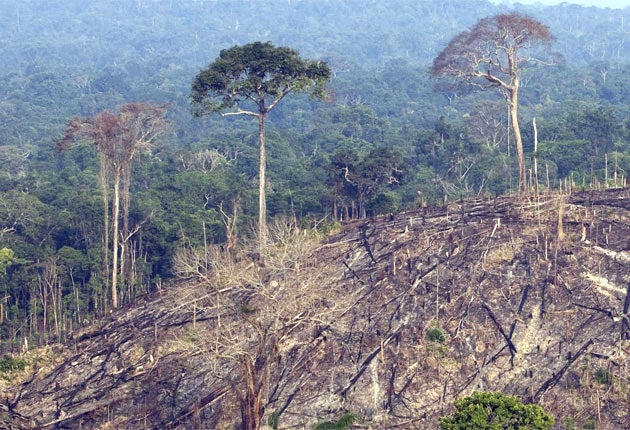Your support helps us to tell the story
From reproductive rights to climate change to Big Tech, The Independent is on the ground when the story is developing. Whether it's investigating the financials of Elon Musk's pro-Trump PAC or producing our latest documentary, 'The A Word', which shines a light on the American women fighting for reproductive rights, we know how important it is to parse out the facts from the messaging.
At such a critical moment in US history, we need reporters on the ground. Your donation allows us to keep sending journalists to speak to both sides of the story.
The Independent is trusted by Americans across the entire political spectrum. And unlike many other quality news outlets, we choose not to lock Americans out of our reporting and analysis with paywalls. We believe quality journalism should be available to everyone, paid for by those who can afford it.
Your support makes all the difference.Brazil has taken a big step towards passing new laws that will loosen restrictions on the amount of Amazon rainforest that farmers can destroy, after its lower house of parliament voted in favour of updating the country's 46-year-old forest code.
In a move described as "disastrous" by conservationists, the nation's congress backed a bill relaxing laws on the deforestation of hilltops and the amount of vegetation farmers must preserve. The law also offers partial amnesties for fines levied against landowners who have illegally destroyed tracts of rainforest. The legislation, which must still be passed by the Brazillian Senate and approved by President Dilma Rousseff, aims to help owners of smaller farms and ranches compete with under-regulated rivals in countries such as the USA and Argentina.
At present, under Brazil's forest code passed in 1965, 80 per cent of all property in the Amazon basin is supposed to be left as untouched forest. In other parts of the country, that figure ranges from between 20 and 35 per cent, depending on the ecosystem of the particular region.
Farmers found to have breached the regulations have until now been required to pay large fines and plant sufficient trees to bring their landholdings up to required standards. But the system is scrappily enforced and only 10 per cent of landowners are currently believed to be in complete compliance with the rules.
Under the new code, forest that was illegally cleared between 1965 and 2008 will be exempted from regulation. In addition, farmers will, for the first time, be allowed to count land along rivers and lakes as part of their legal preserves. And strict rules governing deforestation of hilltops and slopes will be relaxed.
"It's a disaster. It heightens the risk of deforestation, water depletion and erosion," Paulo Gustavo Prado, head of environmental policy at Conservation International-Brazil, told Reuters. He believes that the new bill will result in the loss of roughly 10 per cent of Brazil's remaining rainforest.
Philip Fearnside, of the government's National Institute for Amazon Research, told the Associated Press that the "amnesty" for farmers who broke the law before 2008 will result in further illegal deforestation.
"The proposed amnesty upholds a long tradition in Brazil of legalising the illegal. People believe they can deforest illegally because sooner or later all will be forgiven."
Supporters of the bill, who have been heavily lobbied by farming groups, say the old forest code was impossible to enforce, and argue that the more relaxed laws will help them achieve better compliance.
They also decided to veto the clause in the new forest code most feared by conservationists, which would have completely removed all limits on preserving trees for small farmers and ranchers.
About 20 per cent of Brazil's rainforest has already been destroyed, and the battle to preserve the remainder arouses heated debate. Yesterday, it emerged that a green activist, José Cláudio Ribeiro da Silva, had been shot and killed in the jungle state of Para in northern Brazil. He recently predicted that he would be murdered for criticising deforestation by local ranchers.
A watchdog group, which protects activists and small farmers in the region, said yesterday that the gunmen had cut off Mr Silva's ear, probably so that they could prove to the people who hired them that they had carried out the hit.

Join our commenting forum
Join thought-provoking conversations, follow other Independent readers and see their replies
Comments